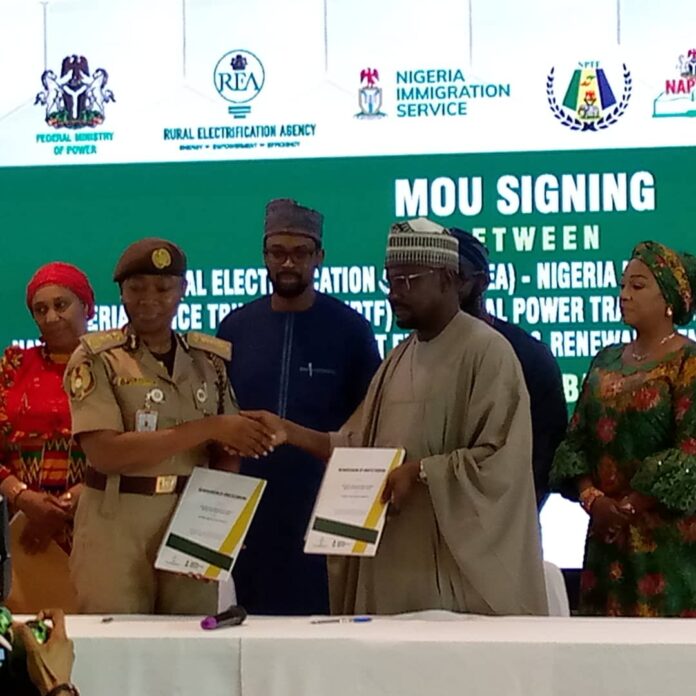In a move to transform Nigeria’s electricity landscape, the Rural Electrification Agency (REA) has signed a comprehensive agreement with critical government agencies and private sector entities to accelerate electrification across the country.
By Chimezie Godfrey
In a move to transform Nigeria’s electricity landscape, the Rural Electrification Agency (REA) has signed a comprehensive agreement with critical government agencies and private sector entities to accelerate electrification across the country.
The event, held at Fraser Suites in Abuja on Friday, marks a significant step towards delivering power to millions of Nigerians, particularly in underserved rural communities.
“Today is quite a significant day.We have Renewable Energy Service Companies (RESCOs) and key government agencies, including the Nigeria Immigration Service (NIS), Nigeria Police Trust Fund (NPTF), National Power Training Institute of Nigeria (NAPTIN), and the National Agricultural Development Fund (NADF), all of whom are here to sign a structured arrangement to electrify key areas of Nigeria’s economy,”said Abba Aliyu, MD and CEO of REA.

Aliyu noted that this partnership is more than a formal signing. “This is a roadmap, a partnership between the REA and these agencies to tackle Nigeria’s electricity challenges,”he emphasized.”
Following the recent Electricity Act 2023, which decentralized and liberalized Nigeria’s electricity sector, Aliyu stressed the importance of a coordinated approach to ensure efficient interventions.
“The REA, by virtue of the Act, is required to develop the National Electricity Strategy and Implementation Plan, a bottom-up approach that will map each community’s infrastructure and integrate it into a national plan.
“This plan will encompass targeted strategies for sectors such as education, health, and agriculture, with the Nigeria Agricultural Development Fund playing a key role,”Aliyu explained.
He also highlighted the security aspect of the initiative. “One of the key drivers of electrification is to address the security challenge in the country.We are signing structured arrangements with these agencies to enhance their work in addressing security challenges,”he said, underscoring the importance of working with the NIS and NPTF.

However, Aliyu noted that the task of electrification would largely rely on the private sector. “The Minister of Power has made it clear that government alone cannot address the electricity challenge.
“The role of the private sector is to bring in funds and financing. That’s why REA developed the concept of RESCOs to harness private investment in renewable energy,”he said.
To further this goal, REA signed additional MoUs with several RESCOs that have demonstrated the capacity to invest in Nigeria’s renewable energy sector. “These RESCOs bring resilience and an ability to incentivize financing, which is critical for addressing our energy challenges,” said Aliyu.
The day’s events included presentations on REA’s ongoing programs, such as the Rural Electrification Fund and the Distributed Access Rural Renewable Energy Schedule Program, designed to bring electricity to 17.5 million Nigerians. Aliyu stated, “We are seeing how these programs can deliver on the President’s vision, and I sincerely hope we will fulfill every commitment made here today.”
Aliyu also commended the Comptroller General of Nigerian Immigration, noting that the MoU with NIS was due in part to her initiative to secure continuous electricity for the NIS’s information and technology infrastructure. “Her dedication to improving the service is invaluable,” Aliyu said.
With financial backers ready to invest, Aliyu remarked on the potential for RESCOs to engage directly with financiers. “They are eager to see projects and invest in them,” he added.
He stressed that the agreement represents a substantial commitment to improving electricity access, addressing sectoral needs, and bolstering national security through reliable energy solutions.
Speaking at the MoU signing ceremony, Olufemi Akinyelure, Head of the Nigeria Electrification Project, highlighted the benefits of the RESCO model, which leverages private-sector investment and expertise while REA provides support through policy frameworks and financing. “This collaborative model ensures the long-term success of off-grid electrification projects and makes energy accessible and affordable, especially for low-income households and businesses through flexible payment options like the Pay-As-You-Go (PAYG) system,” Akinyelure explained.
According to him, the RESCO model also promotes scalability and sustainability by encouraging providers to invest in large-scale projects and enhance corporate governance among local developers.
“Additionally, the strategy aims to create a skilled local workforce and boost Nigeria’s economy through the local production of renewable energy components. Vertically integrated RESCOs will play a vital role across the energy value chain, from manufacturing to delivery, supporting Nigeria’s transition to cleaner energy.
“The framework sets the stage for an impactful partnership that will transform Nigeria’s energy landscape,” said Akinyelure, emphasizing REA’s commitment to driving progress toward a sustainable energy future.
The Executive Secretary of the Nigerian Police Trust Fund (NPTF), Mohammed Sheidu, noted that the initiative, aligned with the government’s Renewed Hope agenda, with aims to deliver sustainable and reliable energy to police stations, barracks, and training institutions, reducing reliance on traditional power sources.
“This collaboration is a testament to our shared commitment to harness renewable energy for the benefit of the Nigerian Police Force and, ultimately.
“The deployment of solar-powered infrastructure will provide a stable energy supply, enabling our personnel to better serve and protect,” he said.
Sheidu emphasized that the MoU focuses on planning, implementation, and monitoring of clean energy projects for key police facilities, including the integration of electric vehicle infrastructure.
According to him, these measures not only enhance police operations but also align with broader goals of sustainability and energy security. “Together, we are investing in the security and future of Nigeria,” he added.
Sheidu commended REA’s dedication to expanding energy access across rural and underserved areas, expressing confidence that this partnership would set a new standard for inter-agency collaborations. “This partnership showcases what can be achieved when we unite towards a common goal,” he concluded.




